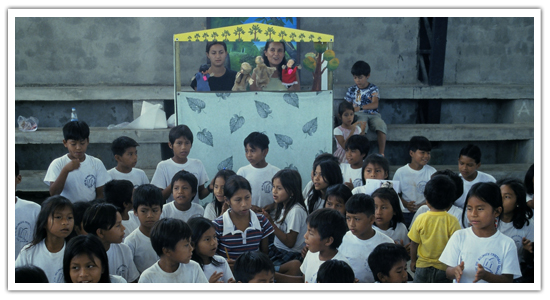Congratulations to Stella de la Torre on being selected as PEN’s January Educator of the Month! Special thanks to Fanny M. Cornejo for her nomination and blog submission.
Dr. Stella de la Torre is a leading primate researcher and conservationist in Ecuador, who is building a legacy in this country. In 1999, she received a Ph.D. in Zoology from the University of Wisconsin-Madison in the U.S. She currently serves as the Dean of the Biological and Environmental Sciences School of the Universidad San Francisco de Quito in Ecuador.
After getting involved with primate research and being the first to conduct ecological and behavioral investigations of species, such as the pygmy marmoset and black-mantled tamarin, Stella realized that there was an immediate need to take conservation action. In 2003, Stella decided to include conservation education as the major tool to tackle the conservation pressures in her study area. Starting with primates of eastern Amazonia, Stella and her team created a program focused on educating the Secoya indigenous groups. She wanted to raise awareness about conservation issues for the primate species of the region. Through games and puppet shows, she slowly began to develop a successful program focused mainly with Secoya’s children, who learned about the importance of primates and the different ways they could contribute towards their conservation.
Later, as Stella’s research took her to different ecosystems and areas of Ecuador, her conservation education activities expanded throughout the country. Stella’s broad knowledge of the primate diversity of Ecuador and the different conservation pressures for these species allowed her to lead various initiatives to raise awareness among urban and rural Ecuadorians about the primate richness of their country and the major threats to their survival.
Through her position as a Professor and Dean of the Department of Biology, she has been able to involve her institution and students in her education efforts. She has trained various students in primatology and on the importance of incorporating environmental education in conservation efforts. Stella and her students have designed various campaigns, programs, and educational materials, including booklets, guides, videos, and games (some examples are provided below). Since primate traffic has been and still is a major issue for primates in the region, she designed and oversaw the creation of booklets and guides to inform the population about this problem and the different ways they can help to stop it.
Stella says, “The greatest challenge for an educator is to leave a mark and create change in the target population.” Over the years, Stella’s conservation education initiatives have reached at least 5,000 people in her country, involving urban and rural villages throughout the different ecosystems of Ecuador.
For further information:
de la Torre, S., Yépez, P. 2003. Environmental education, a didactic tool for the conservation of pygmy marmosets Cebuella pygmaea in Ecuadorian Amazon. Neotropical Primates 11(2): 73-75
de la Torre, S. 2013. Report for Lawrence Jacobson Education Development Grant: Environmental education, a tool for the conservation of Ecuadorian primates. IPS Bulletin 39(1) 18-20 View the report (excerpt of bulletin)
Guía educativa sobre tráfico de animales silvestres/Educational handbook on wildlife trafficking Download resource
Documental sobre el traffico de especies y otros problemas que affectan a la conservacion de primates en la Amazonia/Documentary on species and other traffic problems affecting primate conservation in the Amazon Watch the video
Leoncillos, pequeños habitantes del bosque/Pygmy marmosets, the smallest forest dwellers Watch the video
Este spot es un esfuerzo para frenar el tráfico de vida silvestre/This video is an effort to curb wildlife trafficking Watch the video









